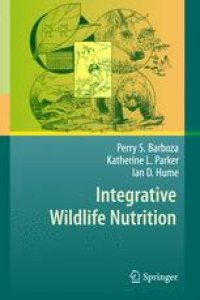
Ebook: Integrative Wildlife Nutrition
- Tags: Fish & Wildlife Biology & Management, Animal Physiology, Conservation Biology/Ecology, Nutrition, Environmental Management, Animal Ecology
- Year: 2009
- Publisher: Springer-Verlag Berlin Heidelberg
- Edition: 1
- Language: English
- pdf
Nutrition spans a wide range of mechanisms from acquisition of food to digestion, absorption and retention of energy substrates, water and other nutrients. Nutritional principles have been applied to improving individual health, athletic performance and longevity of humans and of their companion animals, and to maximizing agricultural efficiency by manipulating reproduction or growth of tissues such as muscle, hair or milk in livestock. Comparative nutrition borrows from these tra- tional approaches by applying similar techniques to studies of ecology and physiology of wildlife. Comparative approaches to nutrition integrate several levels of organization because the acquisition and flow of energy and nutrients connect individuals to populations, populations to communities, and communities to ecosystems. Integrative Wildlife Nutrition connects behavioral, morphological and biochemical traits of animals to the life history of species and thus the dynamics of populations. An integrated approach to nutrition provides a practical framework for understanding the interactions between food resources and wildlife popu- tions and for managing the harvest of abundant species and the conservation of threatened populations. This book is for students and professionals in animal physiology and ecology, conservation biology and wildlife management. It is based on our lectures, dem- strations and practical classes taught in the USA, Canada and Australia over the last three decades. Instructors can use Integrative Wildlife Nutrition as a text in wildlife and conservation biology programs, and as a reference source for related courses in wildlife ecology.
This book applies the basic principles of nutrition to the study of fish, reptiles, birds, and mammals in their natural environments. The acquisition of food, its digestion and absorption, and the retention and utilization of energy substrates, water and other nutrients are treated in detail. This integrated approach connects behavioral, morphological, and biochemical traits of animals to their life histories and their responses to variable and changing environments. The authors also provide a practical framework for understanding the interactions between food resources and wildlife populations, and for managing the harvest of abundant species and the conservation of threatened populations. "Integrative Wildlife Nutrition" provides a general reference work for students and professionals in animal physiology and ecology, conservation biology, and wildlife management. Lecturers can use this text for wildlife and conservation biology programs and as a reference source for related courses in animal ecology.
This book applies the basic principles of nutrition to the study of fish, reptiles, birds, and mammals in their natural environments. The acquisition of food, its digestion and absorption, and the retention and utilization of energy substrates, water and other nutrients are treated in detail. This integrated approach connects behavioral, morphological, and biochemical traits of animals to their life histories and their responses to variable and changing environments. The authors also provide a practical framework for understanding the interactions between food resources and wildlife populations, and for managing the harvest of abundant species and the conservation of threatened populations. "Integrative Wildlife Nutrition" provides a general reference work for students and professionals in animal physiology and ecology, conservation biology, and wildlife management. Lecturers can use this text for wildlife and conservation biology programs and as a reference source for related courses in animal ecology.
Content:
Front Matter....Pages i-xviii
Introduction: Common Themes Across Diverse Taxa....Pages 1-16
Food and Populations....Pages 19-31
Feeding Dynamics: Functional and Behavioral Responses....Pages 33-52
Measuring Food Consumption....Pages 53-72
Digestive Function....Pages 73-93
Carbohydrates: Sugars, Fiber and Fermentation....Pages 97-118
Lipids: Fatty Acids and Adipose Tissue....Pages 119-131
Nitrogenous Substrates: Nucleic Acids to Amino Excretion....Pages 133-156
Metabolic Constituents: Water, Minerals and Vitamins....Pages 157-206
Energy: Carbon as a Fuel and a Tissue Constituent....Pages 209-255
Integrating Nutrient Supply and Demand in Variable Environments....Pages 257-284
Back Matter....Pages 285-342
This book applies the basic principles of nutrition to the study of fish, reptiles, birds, and mammals in their natural environments. The acquisition of food, its digestion and absorption, and the retention and utilization of energy substrates, water and other nutrients are treated in detail. This integrated approach connects behavioral, morphological, and biochemical traits of animals to their life histories and their responses to variable and changing environments. The authors also provide a practical framework for understanding the interactions between food resources and wildlife populations, and for managing the harvest of abundant species and the conservation of threatened populations. "Integrative Wildlife Nutrition" provides a general reference work for students and professionals in animal physiology and ecology, conservation biology, and wildlife management. Lecturers can use this text for wildlife and conservation biology programs and as a reference source for related courses in animal ecology.
Content:
Front Matter....Pages i-xviii
Introduction: Common Themes Across Diverse Taxa....Pages 1-16
Food and Populations....Pages 19-31
Feeding Dynamics: Functional and Behavioral Responses....Pages 33-52
Measuring Food Consumption....Pages 53-72
Digestive Function....Pages 73-93
Carbohydrates: Sugars, Fiber and Fermentation....Pages 97-118
Lipids: Fatty Acids and Adipose Tissue....Pages 119-131
Nitrogenous Substrates: Nucleic Acids to Amino Excretion....Pages 133-156
Metabolic Constituents: Water, Minerals and Vitamins....Pages 157-206
Energy: Carbon as a Fuel and a Tissue Constituent....Pages 209-255
Integrating Nutrient Supply and Demand in Variable Environments....Pages 257-284
Back Matter....Pages 285-342
....